CEJ recognized #IndigenousPeoplesDay with a discussion on social justice and how it intersects with environmental advocacy. Front-line communities and people of the global majority are disproportionately affected by environmental degradation, so it is important that we take these opportunities to not only acknowledge this, but work towards solutions resulting in a more equitable world.
“Each Federal agency shall make achieving environmental justice part of its mission by identifying and addressing, as appropriate, disproportionately high and adverse human health or environmental effects of its programs, policies, and activities on minority populations and low-income populations.”
We were joined by Barry University School of Law’s Nadia B. Ahmad. Professor Ahmad’s research explores the intersections of energy siting, the environment, and sustainable development and draws on international investment law and corporate social responsibility. She has published over 30 scholarly articles and book chapters. In 2016, she was recognized by the Orlando Business Journal as a 40 Under 40 honoree for her leadership and community involvement.
In 1991 at the First National People of Color Environmental Leadership Summit, Dorceta Taylor, an environmental sociologist known for her work on both environmental justice and racism in the environmental movement, proposed the Principles of Environmental Justice (pictured below). In these 17 principles she identified 25 different issues, including protection from contamination and polluting industries, environmental policy based on mutual respect, and demands for numerous rights and other capabilities: equal participation, self-determination, ethical and sustainable land use, a healthy community and work environment, and social and environmental education. These original principles explicitly identified indigenous issues, such as treaty responsibilities and relationships between culture and nature.
Please follow the Center for Earth Jurisprudence for more discussions with local experts on issues affecting our relationship with Mother Earth and our fellow members of the Earth community.

